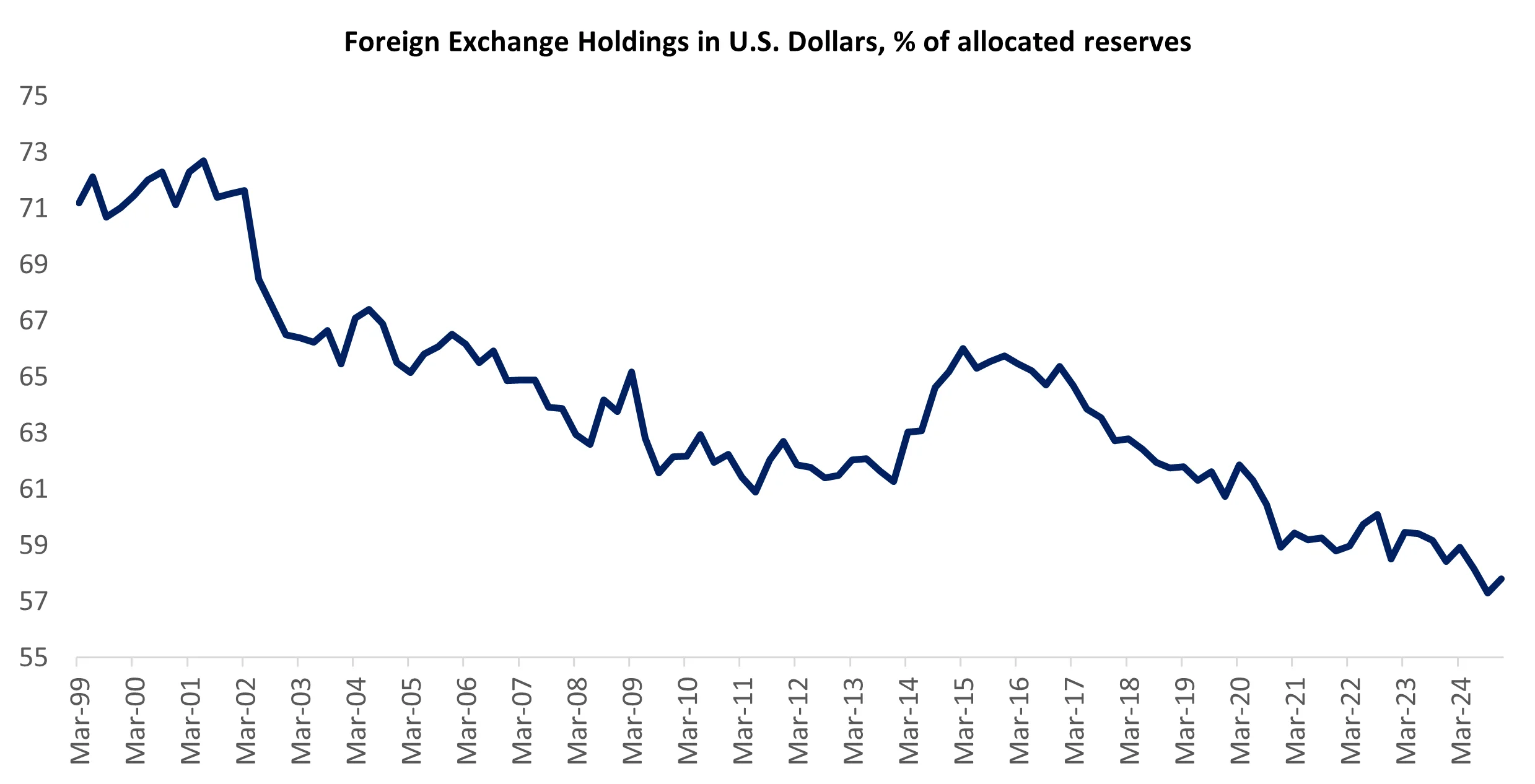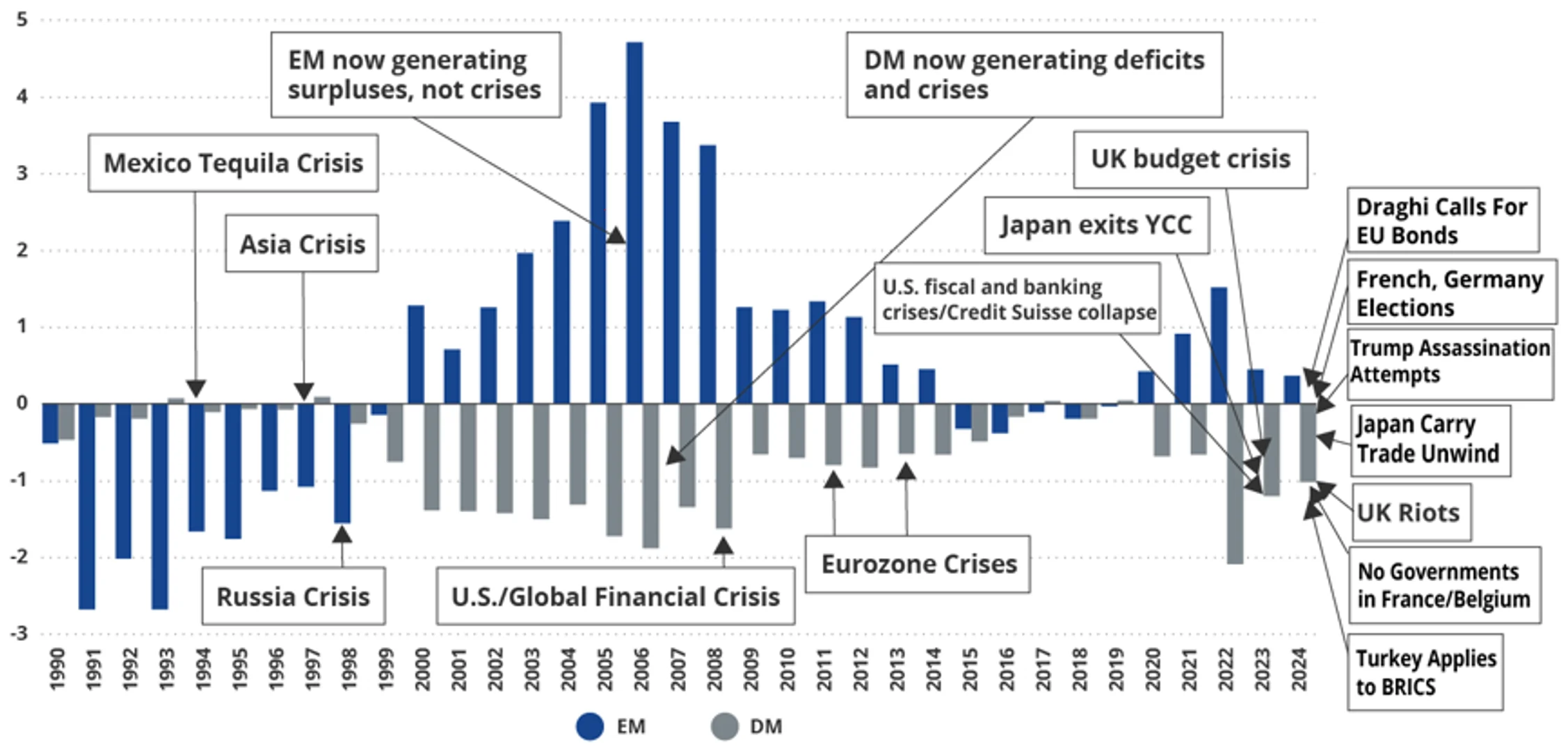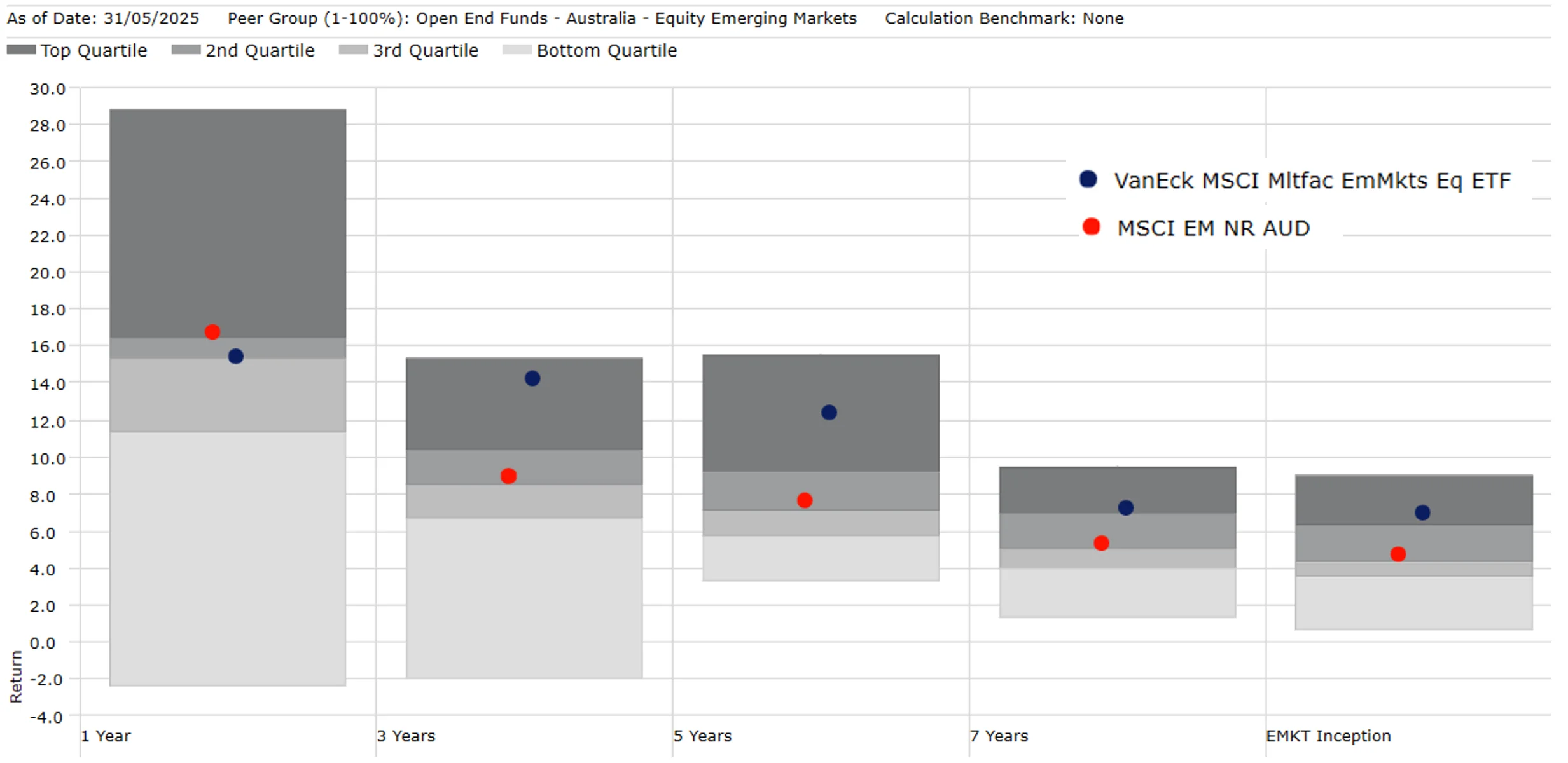The emerging empire strikes back
Why emerging markets?
For investors, the recent volatility in all markets has them wondering where to find value and long-term opportunity. There are a few reasons we believe emerging markets are one of the most mispriced asset classes:
- The recent rounds of tariff announcements, pauses and negotiations have highlighted that geopolitics are helping emerging markets. Emerging market equities have outperformed developed market equities since ‘Liberation Day’, as many of these economies are less reliant on the rest of the globe and can adapt quicker to changing logistical needs.
- The mismatch between the size of emerging markets’ economies and the size of their capital markets creates a long-term opportunity for investors. In addition, these capital markets are evolving, emerging to become as strong and competitive as developed markets in some instances.
- Emerging markets are responsible for over 50% of the world’s GDP, yet their equity markets only represent less than 15% of the market capitalisation of all international equities.
- Demographic and urbanisation trends should provide supportive tailwinds for long-term growth. 87% of the world’s population is in emerging markets, and these populations are younger than developed markets. Over 75% of the world’s population aged between 15 and 24 are living in developing and emerging markets.
- Emerging markets are maturing from a fiscal and monetary policy standpoint
Chart 1: Developed markets need financing from the surplus-producing emerging markets, which are net US dollar creditors

Source: VanEck; International Monetary Fund (IMF); Bloomberg LP. Data as of December 2024.
Chart 2: Fiscal (and political) crises take place outside of emerging markets

Source: VanEck; International Monetary Fund (IMF); Bloomberg LP. Data as of December 2024.
We have said this before, but many emerging markets have matured. Traditionally, the investment returns have been closely correlated to the rise and fall of commodities and global growth expectations. Over the past 20 years, this has been changing. Many of the world’s leading technology, consumer and healthcare companies are listed on emerging markets exchanges.
Emerging markets themselves are not a monolith. Many have learned from the lessons of the past and undertaken economic reforms. As a result, these economies may be able to achieve a more stable and higher level of growth. Many emerging market economies are better able to implement counter-cyclical fiscal expansion to reignite domestic growth because of their growing foreign reserves, strong budgets and robust balance of payments. This helps the companies in these countries. Additionally, many emerging markets hiked higher and earlier than most developed markets and are not hampered by the after-effects of unorthodox monetary policy, therefore many emerging markets companies are coming out the other side of inflationary cost pressures with higher forward earnings growth.
While emerging markets still have their share of political crises, many of these countries, you could argue, are in better fiscal and monetary policy health than many developed market counterparts, and equity markets are starting to reflect this reality.
However, not all companies in the MSCI Emerging Markets Index are desirable from an investment standpoint.
This is where being selective in emerging markets equities can come to the fore. It was a little over seven years ago that we listed the VanEck MSCI Multifactor Emerging Markets Equity ETF (EMKT) on ASX. At the time, we argued emerging markets equities were under owned due to difficulty of access, costs, with most active managers charging a premium for investing in these ‘exotic’ locations, and misapprehension about the political risks in emerging markets.
EMKT tracks the MSCI Emerging Markets Multi-Factor Select Index (EMKT Index). The Index selects companies based on four factors: Value, Momentum, Low Size and Quality.
The efficacy of this approach was supported by the 2024 research paper, titled Factor-in emerging markets. According to the research paper, EMKT’s multi-factor methodology “is an all-seasons approach that has historically outperformed the benchmark over the long term. The bottom-up approach and selection of four factors (quality, value, momentum and low size) were found to be the most optimal for maximising Sharpe and information ratios.
EMKT has delivered long-term historical outperformance
Since its inception on 10 April 2018, EMKT has returned 7.96% p.a., outstripping the standard industry benchmark, the MSCI Emerging Markets Index, by 2.33% p.a. As always, past performance is not indicative of future performance.
Table 1: Performance as at 25 June 2025

Source: VanEck, Morningstar Direct
#EMKT inception date is 10 April 2018 and a copy of the factsheet is here.
Results are calculated to the last business day of the month and assume immediate reinvestment of distributions. EMKT Performance is calculated net of management fees and costs incurred in the fund, calculated daily, but does not include brokerage costs or buy/sell spreads of investing in EMKT. Past performance is not a reliable indicator of future performance. Returns longer than one year are annualised.
The MSCI Emerging Markets Index (“MSCI EMI”) is shown for comparison purposes as it is the widely recognised benchmark used to measure the performance of emerging markets large- and mid-cap companies, weighted by market capitalisation. EMKT’s index measures the performance of emerging markets companies selected on the basis of their exposure to value, momentum, low size and quality factors, while maintaining a total risk profile similar to that of the MSCI EMI, at rebalance. EMKT’s index has fewer companies and different country and industry allocations than MSCI EMI. Click here for more details
EMKT’s performance is impressive, relative to the market benchmark, MSCI Emerging Markets Index. It is also worth considering its performance relative to active peers. EMKT’s performance puts it in the top quartile of active peers over three, five, seven years and since inception. EMKT’s management fee is just 0.69% p.a.EMKT adopts a smart beta strategy that provides investors with the best of both active and passive worlds: Active outcomes Passive low fees
It is worth noting in Chart 3 below that the MSCI Emerging Markets index has beaten more than 50% of active emerging market managers in those trailing periods. In other words, over 50% of active managers are not adding value, after fees, despite the ‘inefficiency’ of emerging markets and the opportunities this may present.
Chart 3: Performance relative to active manager peer group

Source: Morningstar, to 31 May 2025. Past performance is not a reliable indicator of future performance. Results are calculated to the last business day of the month and assume immediate reinvestment of distributions. Results are net of management fees and other costs incurred in the fund, but before brokerage fees and bid/ask spreads. Returns for periods longer than one year are annualised. Peer group Equity Region Emerging Markets funds invest in companies listed in emerging markets from around the globe. Emerging market securities typically account for at least 75% of the portfolio.
Key risks:
All investments carry risk. An investment in EMKT carries risks associated with ASX trading time differences, emerging markets, financial markets generally, individual company management, industry sectors, foreign currency, country or sector concentration, political, regulatory and tax risks, fund operations, liquidity and tracking an index. See the PDS for details.
Published: 01 July 2025
Any views expressed are opinions of the author at the time of writing and is not a recommendation to act.
VanEck Investments Limited (ACN 146 596 116 AFSL 416755) (VanEck) is the issuer and responsible entity of all VanEck exchange traded funds (Funds) trading on the ASX. This information is general in nature and not personal advice, it does not take into account any person’s financial objectives, situation or needs. The product disclosure statement (PDS) and the target market determination (TMD) for all Funds are available at vaneck.com.au. You should consider whether or not an investment in any Fund is appropriate for you. Investments in a Fund involve risks associated with financial markets. These risks vary depending on a Fund’s investment objective. Refer to the applicable PDS and TMD for more details on risks. Investment returns and capital are not guaranteed.
EMKT is indexed to a MSCI index. EMKT is not sponsored, endorsed, or promoted by MSCI, and MSCI bears no liability with respect to EMKT or the MSCI Index. The PDS contains a more detailed description of the limited relationship MSCI has with VanEck and EMKT.




